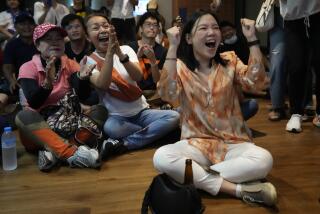A Figurehead With Absolute Powers
- Share via
BANGKOK, Thailand — When Thailand’s government fell in November and haggling politicians could not decide on a new prime minister, the palace’s royal doctor prescribed some medicine that jarred Thais even worse than the country’s collapsing economy had.
King Bhumibol Adulyadej was in the hospital, worried sick by the bickering in a moment of national crisis, the doctor said.
The canard worked. Within hours, the politicians had closed in on a deal, and the king had miraculously recovered.
It would be difficult to imagine such an antidote working in Britain or other countries where monarchies are under siege, but for more than five decades, whenever national nerves are jangled, Thais have turned for comfort and reassurance to their beloved American-born king.
Though little celebrated outside Thailand, Bhumibol, a trim and youthful-looking man of 70, has been elevated to near-deity status by both rich and poor Thais.
He is, they say, the glue that holds society together, a status he has earned--and not just taken by birthright--by never losing touch with his 60 million subjects.
“Without His Majesty, Thailand would be chaos,” Busakorn Karnchan, a professor of Asian affairs at Chulalongkorn University in Bangkok, said of a country that since 1932 has had 17 coups, 23 prime ministers and 16 constitutions.
“I like living, but if I could lay down my life so that our king could live longer, I would do it in a minute. Without a second thought,” Busakorn said of the world’s longest-reigning monarch.
Many Thais would echo the sentiment about their king, who, in the last 30 years, has not left Thailand except to take a few symbolic steps over the Mekong River into Laos in April 1994.
Bhumibol--the great-grandson of Mongkut, depicted in the Rodgers and Hammerstein musical “The King and I”--is a constitutional monarch with few clearly defined powers. But his authority is incalculable. The fact that it is against the law to criticize the royal family is irrelevant: In a political system rife with corruption and skulduggery, the king is the one public figure everyone trusts.
With just a word, he can end bloodshed in the streets and, even in the bleakest of moments, calm his people and give them faith in the nation’s future.
His hospitalization in 1995 because of constricted coronary arteries threw worried Thais into a national depression deeper than the one that now grips Thailand, where the economy is in a free fall. During his illness, 100,000 people showed up at his hospital to pray. Even today, a Thai journalist recalling the king’s illness was so moved that she had to leave the room.
*
Before every movie is shown, the king is seen in a grainy old newsreel, trudging down a road to examine rural development projects. His portrait hangs in every office building and most homes. Thais celebrate his birthday, Dec. 5, as “Father’s Day.” He stands for hours each spring personally handing out diplomas to university graduates. Each of the thousands of graduates gets his or her picture taken with the king.
Last year, three students missed the photo opportunity because of an electrical failure in the auditorium. When the king learned of this, the three were invited to the palace for a private photo session.
Although seldom publicly involved in political intervention, Bhumibol is not shy about using his crown when things go wrong.
“The king has a right to make political remarks,” he once said. “He is a Thai citizen and has his rights and freedoms under the constitution.”
When student demonstrators clashed with soldiers in 1972, all he had to do to end the bloodshed was appear on television and ask for the restoration of order.
Nine years later, a group of army colonels tried to overthrow the government. Bhumibol gave the prime minister refuge in his palace, and the coup quickly collapsed.
Dozens died in 1992 when democracy advocates trying to overthrow the military-dominated government battled soldiers on the streets of Bangkok.
Bhumibol summoned the prime minister and the leader of the democracy movement to a televised meeting. They approached, prostrating themselves on hands and knees, to receive the king’s public scolding.
The violence stopped. The prime minister, a former army general, resigned in disgrace.
“There are few figures in the world who can achieve what King Bhumibol can with just a word or a quiet request,” a Western diplomat said. “And the remarkable thing is, he doesn’t have any official power. All his authority comes from the veneration of his people. He is a figurehead with teeth.”
Only through a series of tragedies did Thailand get Bhumibol Adulyadej as its king.
He was born in Cambridge, Mass., where his father, Prince Mahidol, was a medical student at Harvard. His mother, a Thai commoner, was a nursing student. Mahidol, who was not directly in line to inherit the throne, went on to become the founder of modern Thai medicine. He died in 1929.
After a bloodless coup in 1932 sharply limited the powers of the royal family, King Prajadhipok, the absolute monarch and the brother of Mahidol, abdicated without an heir.
The crown passed to Bhumibol’s older brother, 10-year-old Prince Anand. A regent was installed while both brothers went to Switzerland to finish their schooling.
On June 9, 1946, Anand, then a 20-year-old king, was found dead with a bullet through his head in his Bangkok palace. The death has never been explained.
Bhumibol, still a teenager, became king, taking over a 700-year-old monarchy that was self-destructing and controlled by the military.
“When I opened my mouth, they [the generals] would say, ‘Your Majesty, you don’t know anything,’ ” Bhumibol once recalled. “So I shut my mouth. I know things, but I shut my mouth.”
More to Read
Sign up for Essential California
The most important California stories and recommendations in your inbox every morning.
You may occasionally receive promotional content from the Los Angeles Times.













